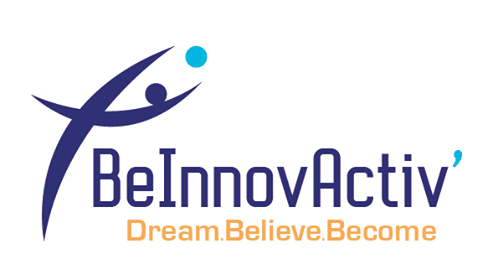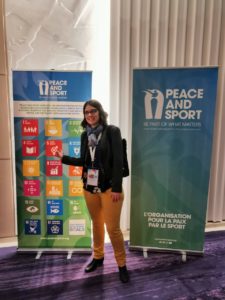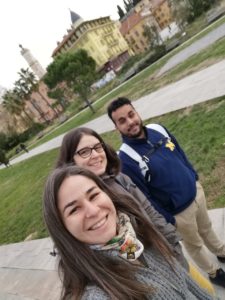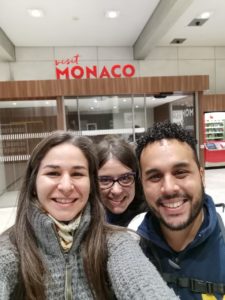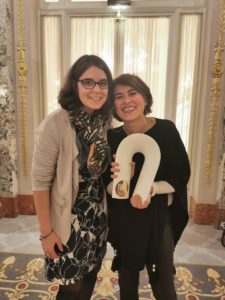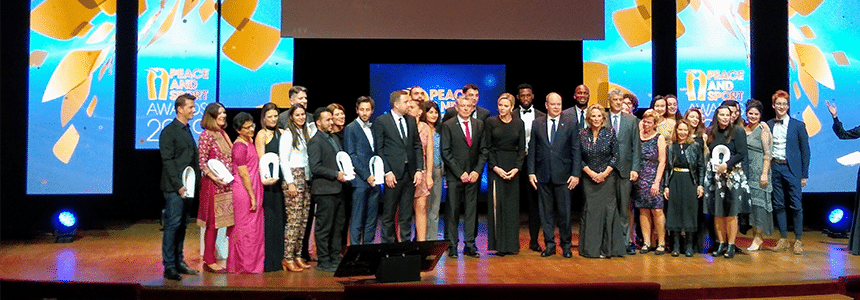
Last week was the twelfth edition of the Peace and Sport Forum in Monaco.
I attended the event as the founder of BeInnovActiv’ and alumnus of the Global Sport Mentoring Program. The GSMP was awarded the Peace and Sport Trophy for Diplomatic Action in 2018. I would like to share my experience with you through this article. In particular, I’ll be sharing my own perspective on this gathering of champions for peace.
Glitters and sequins: the magic combination to promote sport for peace?
Despite the interprofessional strike that has slowed down France for a few days now, the event was able to unite – and to unite well – in a majestic setting. Glitters and sequins were there.
Like some of the young participants in the “Investing in Youth” programme launched this year by Peace and Sport as part of the Forum, I often felt like I was floating in a world to which I do not belong. That of the princely protocol and VIPs in particular. After all Monte Carlo is the embodiment of glamour. Every street may remind you of some pictures of Princess Kelly.
Make no mistake, I am grateful to have experienced it. However, just like some Peace and Sport Awards nominees or participants I had the chance to discuss with, I have sometimes felt shattered. For example when I noticed the discrepancy between the shared messages, the highlighted actions and the splendour of the place.
It is undoubtedly in the paradox between the neutrality of the country where the organisation was born (ie Monaco) and the declared will to be an intervention force for peace through sport that myths and opportunities are born.
What messages to remember from this Forum?
Let’s fight the right fight alltogether
My participation was primarily motivated by my desire to support certain actors on the ground, my champions of peace. Yet I also let myself be carried away and inspired by some speakers. If their messages particularly marked me, it is undoubtedly that they carry the seeds of what I perceive as essential in terms of sport for development. Thus S.A.S Prince Albert of Monaco reminded us that “our common fight revolves around the dignity of the human being”.
Who says cause, says inspiration and models. Siya Kolisi (captain of the South African Team World Rugby Champion in 2019 and elected Champion of the Year at the Peace and Sport Awards) and Daniela Bas (Director of the Division for Inclusive Social Development at the United Nations) are role models for many of us. But their humility and their insight led them to share, one at the opening of the Forum and the other at the end of the Awards ceremony, a joint invitation. “We can all be role models for others. Let’s leave our “dis” at home and only take our ABILITY with us” said Bas. When Siya later insisted on “Never giving up. Think of all those who will look up at you. Be a role model.”
Finally, Afridun Amu, the first Afghan surfer, shared his inspiring definition of joy. “Joy is neither in the past nor in the future, it is lived in the present moment, purely and simply!” A definition which, although meaningful for everyone, is of particular interest in the specific context of sport for development and peace.
Allow us to dream the dream
On the occasion of this twelfth edition of the Forum, the Peace and Sport Champions for Peace Club celebrated its 10 years. Many athletes were present. All of them I looked at and looked up with stars in their eyes. Because they represent heroes of resilience and performance … For their sportive achievements make us dream. Probably as well because we perceive them as untouchable demigods.
Yet the Forum confirmed my feeling…
The true Champions for Peace, or at least MY real champions for peace, are those who on the ground every day work. Sharing a humility and passion to get things done and making the world a better place. And in the context of sport for development and peace, this very often means putting their life in danger… So that these ideals can live.
My champions for peace…
Let me tell you the story of Claudia and Hector who came from Venezuela to represent their organisation. Deporte Para el Desarrollo, was indeed nominated for the Award dedicated to # April6, on the Forum. I had the privilege of sharing their daily life during the 4 days they spent in France and Monaco.
About Venezuela
First of all, and in order to put things back into perspective, it is important to remember that the minimum wage in Venezuela (which concerns about a third of the population) is 8 dollars per month … No there is no mistake here… Therefore do I need to say that their participation in the Forum, estimated at around $ 2,000 between registration for the Forum and transportation costs (the equivalent of 250 months of minimum salary), would not have been possible without the support of organisations and patrons who believe in them and in the positive impact of their participation?
It did not matter that I don’t speak Spanish, the warmth and passion they exude is communicative. You can immediately feel their love for their country and their desire to help make it better. They are in this respect Champions for their country and champions for peace. in other words, both of them are amazing ambassadors of Venezuela and of Grassroorts Sport Diplomacy.
Listening to them speak about Venezuela (in English obviously so that we could exchange), I felt the desire to visit a country with a thousand promises, culturally rich and a calling from its lush nature. Their passion made me want to dance with them and explore this warm culture. Yet, my heart ached as well. Indeed expressed in half words, I could feel their own heartbreaks, their unspoken cry of the heart. Because Venezuela faces serious economic and social challenges. In 2016, the country had the second-highest murder rate in the world. With hyperinflation, food shortages, malnutrition and a significant increase in infant mortality rates have appeared. 25% of the population lives in extreme poverty, the country is literally experiencing a humanitarian crisis.
They did not talk about political oppression … I am the one who feels the fear because who knows what change the trophy won in Monaco and the light put on their actions on the ground will bring to their life.
… Winners of a # PISF2019 Award…
Because yes, Hector and Claudia have, against all odds, won the Awards dedicated to the #April6 initiative of the year. An award that rewards the individuals and organisations who contributed to the celebration of April 6. As you may know, this is the International Day of Sport in the Service of Development and Peace.
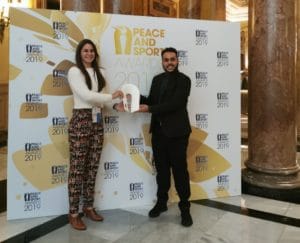
When asked, how did you feel when your names were mentioned during the ceremony, I am happy to say that they will not remember this gag moment when Anne-Laure Bonnet, the master of ceremonies, revealed their last names before the envelope was opened by Paula Radcliff who presented the award.
No, their reaction was one of complete surprise. To have accompanied them the days and hours preceding the ceremony, I know that it was not feigned. Claudia had her phone ready to film the winners … Hector had to repeat twice to her “Claudia it’s us they are calling” for her to finally understand.
The power of celebrating for a country
A few hours later, as we took the time for an in-depth interview, they still could not believe it. They confide to me they felt privileged and like ambassadors of good news for their country. Their simple wish is for this award to be a message of hope for their compatriots. They are struggling to put words into the wave of reactions that the news has sparked.
Their humility and emotions on edge, they reveal themselves and want me to write: “This triumph is not only ours but that of all of Venezuela! Nothing in the world that is worthwhile has been accomplished without passion, and that was the main driver of this initiative. And now we can only thank each of you. Never underestimate yourself because today we are witnesses that any victory is possible.” For them, the invitation letter received as a nominee organisation was already a recognition that the world is interested in the approach they have developed. But now, they dream that this trophy will resonate as an invitation to the various allies to visit Venezuela and to invest in change.
… a committed pack of changemakers
Beyond the first “Learn, Play, Try” festival which won them this Award, Hector and Claudia are my champions of peace for their daily commitment. When I asked them about their mission and the reason why they created Deporte Para el Desarrollo, they tell me that they want to “simply” work to make the kindness and warmth of the Venezuelan culture bear fruit by bringing a new breath. However, they also understood that sport is the only bastion in which politics has and will not find its place. The only area of freedom that families will never give up: at the cost of sacrificing food or medicine if necessary! Because sport and athletes are respected, because its practice provides protection in the community, they, therefore, make sport a platform for social change, a tool for appeasement and development… Peace in its most noble sense of the term if you ask me!
What do all those involved (average age 23 years) have in common in their organisation? “We are all driven by the desire to advance our society. We know that this is possible by relying on the new generations. This is why we are working to offer a set of coherent standards, based on respect and understanding, that children must learn but above all understand … it goes through play! “
The team has developed a unique methodology and contributes to the promotion of sport for development, a concept still rather unspread in Latin America. By participating in the forum, their objective was to offer a sounding board for their ideas. In order to introduce the concept to the public space and to fuel the debate.
How do these champions for peace convert the try on the field?
Concretely, Deporte Para el Desarrollo works around 3 axes:
- First, by training coaches in a method around teaching social skills through sport. Since its creation in 2012, the organisation has trained more than 1,000 coaches, each of whom then accompanies 20 to 40 children. It is worth noting that the activity of sports coaches is absolutely unregulated in Venezuela and that most of them, therefore, have very little or no training. Hector and Claudia describe the coaches trained as philanthropic entrepreneurs, devoted to their community and unfortunately still often underpaid.
- Secondly, the development and implementation of sports activities for young people. These activities are aimed at young people from the working classes as well as the wealthy. They thus allow a certain social mix and erase disparities during the time of training. Their objectives, beyond the technical aspects of the sporting discipline, are to equip the young participants with the social skills necessary for their development, in particular around planning and leadership.
- Finally, there is an investment in parents and communities. Deporte Para el Desarrollo regularly organizes workshops and exchanges in order to explain and explicit the model of change proposed by the organisation. The objective is to raise awareness of the practice of sport and to raise awareness around living together.
Their recipe for success?
First of all, a hint of the “El Loco” method (yes I’m a football lover so could not help this pun) … In other words, observing what is done elsewhere 🙂 . The methodology was indeed developed after a year spent reading and absorbing studies, surveys, and programs existing around the world. The team took the time to travel and learn from good practices by training in no less than 5 different approaches. They then adapted everything to the local context to create its very own formula. In other words, a flexible method adapted to the context of Latin America. No mobile application here, the coaches do not have smartphones or internet access on a regular basis!
But what makes the difference, according to Hector, is also and above all that the method developed puts the human at the center, over and over again. As Claudia explains, “We are creating a methodology for coaches to teach social skills because we know that not every child will be a top athlete, but every child must be a good citizen. We develop human beings. “
Finally, perhaps the secret ingredient: making gender equality a pillar of the organisation. Hector and Claudia explained to me that when women and girls play sport, it is the whole community that changes because, in Venezuelan society, women remain the central figure of the family. Through sport, they also show the way for these young girls, particularly in terms of social prospects and careers. This is empowerment through sport and this is how they invite them to be an agent of the change they wish to see.
